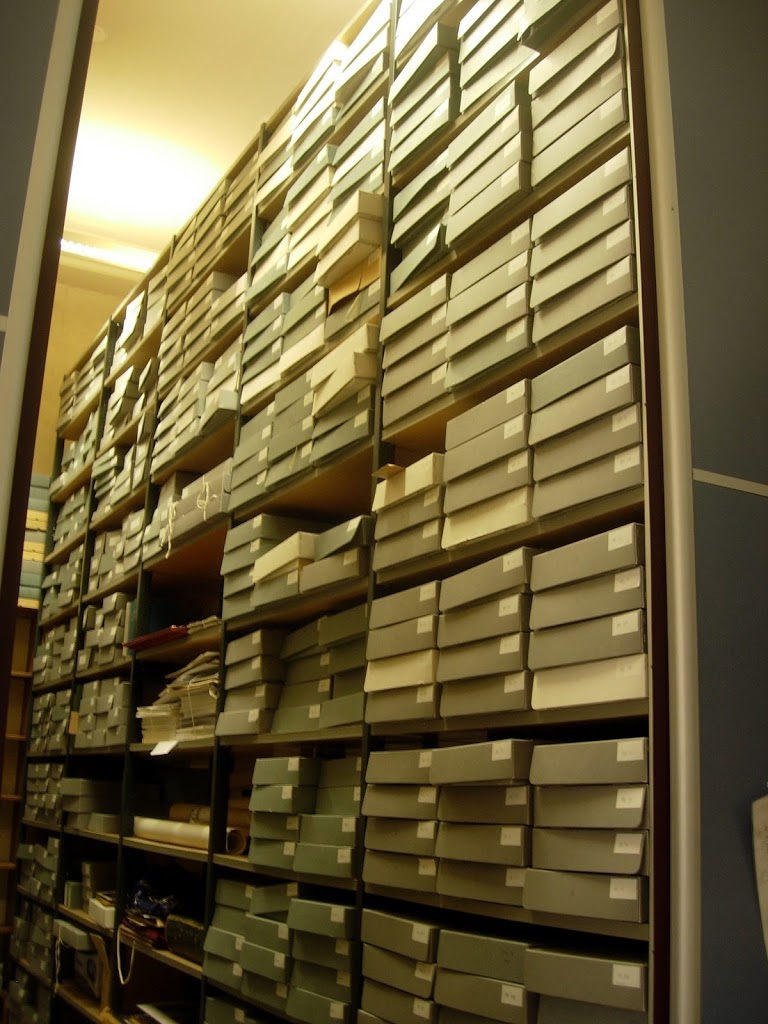We’ve recently returned from a busy week at the Conservative Party Conference in Birmingham – see our welcome to delegates on the Blue Blog – and we enjoyed talking to conference delegates about the archive and our work. One of the most common questions we had from visitors to our stand was, in fact, the most basic: ‘What DO you do?’
That’s not a simple question to answer. Well. There is a simple answer – we act as the archive of the Party’s central organisations, from Central Office to much smaller committees. But a working archive, especially one located in the very busy Bodleian Library, does quite a bit more than just hold papers.
So what do we do? Loads! There are three of us in the archive, and quite a bit of our daily work involves responding to enquiries from researchers all over the world. In the past year, we’ve answered hundreds of questions and helped students, academics, and anyone with a research interest visit the Bodleian to view material from the Archive.
The questions and research interests we see range from simple – ‘We’d like to use one of your posters in our TV programme or come see it at the Bodleian; how do we go about arranging that?’ – to much more complex. One researcher needed circulation statistics for Conservative publications in the 1930s, as well as information on travelling cinema vans. Another was trawling through literally thousands of files, looking for a few specific references. Other research questions deal with just about every aspect of Conservative and British history, policy, and people.
 |
| Shelves and shelves of material |
Helping with research – both by answering questions or helping readers get files – takes up a good chunk of our time. But in order for researchers to use our material, they have to be able to find it. We receive new material regularly – both current and historical – and this has to be added to our existing holdings. Sometimes this is an easy job, but at other times it means wading through dusty boxes of fragile papers from the 1940s, trying to read handwriting of varying quality and determining how best to categorise material so that it will be easy to find. We’re working on it all the time so that our catalogue is up to date – for instance, right now we’re trying to develop a thorough listing of all of our speeches and speech drafts, going to the 1950s. This sort of work really helps us to get to know what we have, and we find all sorts of interesting things when we’re doing it (we’ve stumbled across things like ‘I Like Ike’ badges from 1950s US presidential elections and some fantastic Christmas cards from various politicians).
When we’re not working with readers/researchers or on holdings, we’re focused on a number of projects we have in the pipeline. A few years ago, we digitised our election poster holdings (there’s the potential for a book of them at some point). We’re working on a similar project with various political cartoons in our archive – keep an eye out for part one, which should go live soon. The process is a lot of work – photographing, adding metadata and search information, and more. We are also involved with what has become a very important debate: how to preserve material that is ‘born digital’. How can we preserve digital Party information – such as posters, leaflets, websites blogs, etc. – in the Archive? The British Library has been working on the question over the past few years, and we’re having a trial run now too. It touches on issues at the very heart of what archivists do; we don’t just hold and preserve material, we create and preserve the historical record and share it with a community.
Then of course, we do spend some time at exhibitions or events like the Conference – making sure people know what we have and how to access it. Feel free to ask about what we have or what we do – just contact us through our website.
(If you’re interested in conference/party history, have a look at Alistair Cooke’s post on the Chamberlains and Birmingham – he used material from the archive to write it)

